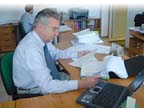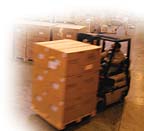The Italian Job

Despite substantial internal efforts, AKA was unable to gather significant legal evidence or quantify damages. Difficulty lay with the complex and rigid labor and tax laws in place in Italy, as well as a lack of honest cooperation from the subsidiary’s legal and financial consultants. Certain of misconduct, or at least significant operating errors, the company was unable to pierce Italy’s foreign business culture and lacked a trusted resource to effectively investigate their concerns. But AKA knew steps had to be taken to remedy the situation.
Upon referral from another multinational corporation, AKA contacted Pyramid Intnl., a Bologna, Italy-based investigative and security services firm specializing in assisting companies with investigations and other corporate security measures throughout Italy and Southern Europe. Specifically, the firm had spent more than 30 years working with labor lawyers, legal counsel, financial consults and government entities in Italy, developing a strong understanding of Italian and European business and legal practices. AKA hired the firm to investigate their fraud and theft concerns at the Italian subsidiary, examine documentation from previous internal investigative efforts and determine if enough evidence could be found of fraud to warrant a full-fledged investigation into previous years.
"Based in Italy, Pyramid already understood the language and culture of the employees working at our subsidiary," said John Burns, AKA vice president of operations. The investigative firm was given access to all of the subsidiary’s records and employees, in addition to the company’s early investigative results, to verify whether or not sufficient evidence of fraud during the previous calendar year warranted additional investigation, to obtain evidential proof of the theft and to estimate the total value of theft.
The firm’s investigative team examined all available records and performed interviews with various employees at the Italian subsidiary. In large part due to their understanding of Italian business regulations, operating procedures and language and culture, the team was able to quickly develop proof of misconduct by officials within AKA’s subsidiary, particularly in unraveling the tangled web of paper trails and false information. Whereas the parent company had spent well over a year in its own investigation, the contracted firm produced their report within months.
Preliminary results verified that substantial evidence existed concerning various types of fraud taking place and that further examination of previous years was warranted. Following the preliminary investigation, the firm’s managing director, Roger Warwick, met with staff members of the Italian subsidiary to obtain a clearer vision of how the subsidiary operated, examine possible techniques used by fraudsters and to obtain the opinion of the parent company’s internal auditors regarding the probability of theft having been carried out in years past.
"It was obvious from the information we were able to piece together that activities had been taking place at the subsidiary that lacked legitimacy," said Warwick. "The subsidiary had been able to fend off investigative efforts by the parent company without being caught simply through misrepresenting records, creating a web of involved employees and partner companies, and playing off of the communication gap."
Over the course of the six-month investigation, the investigative team produced enough evidence to implicate the subsidiary’s financial manager.
"Pyramid’s investigators revealed a large network of fraudsters, including a number of high-level employees and administrators at our subsidiary," said Burns. "Utilizing their positions of power and influence, as well as acting as the only conduits of information back and forth with the parent company, these fraudsters were able to keep their illegal activities secret for a number of years."

Types of fraud
Despite the fraudsters’ efforts, once Pyramid investigators understood how the subsidiary operated and knew what to look for, they were able to find clear evidence of three separate schemes used to commit fraud:1. Shipping more product than was billed, including the shipping of non-standard quantities, particularly amounts invoiced that would not have warranted shipping by themselves.
2. Duplicate shipping orders using the same shipping numbers, but to different clients, with the second shipment being delivered by courier never being invoiced.
3. A method similar to number two, where a duplicate shipping order was generated using the same invoice number but to different shipping addresses and the goods delivered by AKA vans and employees.
At the end of the year, auditors would correlate inventory with company records – a practice that would otherwise have given the parent company a clear indication that something was amiss. According to employees that cooperated with investigators, a mad scramble of stock movements would take place in the subsidiary’s warehouses to hide stock shortages, including adjustments to show that significant amounts of stock were being held offsite – a fact that was never checked by auditors.
According to the investigation results, the subsidiary’s financial manager organized most of the fraud himself until it became too large for him to cover up from members of his staff, at which point he involved other employees. Goods were delivered without invoices and double quantities of goods were crammed onto pallets that were invoiced only for the normal pallet amount. The weight of the goods was never checked, only the pallet info on the invoice and the amount charged.
Due to the scope of business handled by the subsidiary over the past 10 years, the investigative firm deemed it best to limit their scope to operations that took place from 1997 to 2001. This kept the investigation manageable and focused on clients in select areas owned by particular individuals. Overall, the investigation revealed that from 1997 to 2001, more than 171,000 kg of material were delivered to clients without an invoice ever being issued.
"The scale of theft was immense and was being perpetrated systematically over a number of years," said Burns. "We couldn’t have gotten to the bottom of this without having a trusted partner entrenched in Italy and understanding of European business operations, customs and cultures."
Although investigations are pending for years prior to 1997, based on the scope of fraud and methods of theft and length of employment by key perpetrators, the investigative team made the analysis that it was reasonable to assume fraud was taking place on some level for more than 10 years.
"In determining loss, it shouldn’t be forgotten that those who perpetrated the fraud were doing so on company time," said Warwick. "A full estimate of the damages should not only take into consideration the value of goods stolen, but the value of potential profits lost or which should have been generated had employees been dedicating company time to actual business rather than theft."
Based on the final summary analysis of the initial investigation, the contracted firm’s officials reported a conservative estimate of total damages to be approximately $4 million. Further investigations and prosecution are ongoing.
Looking for a reprint of this article?
From high-res PDFs to custom plaques, order your copy today!






